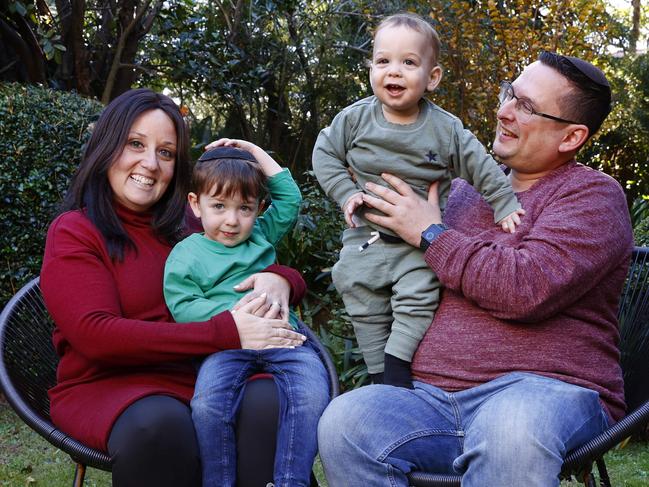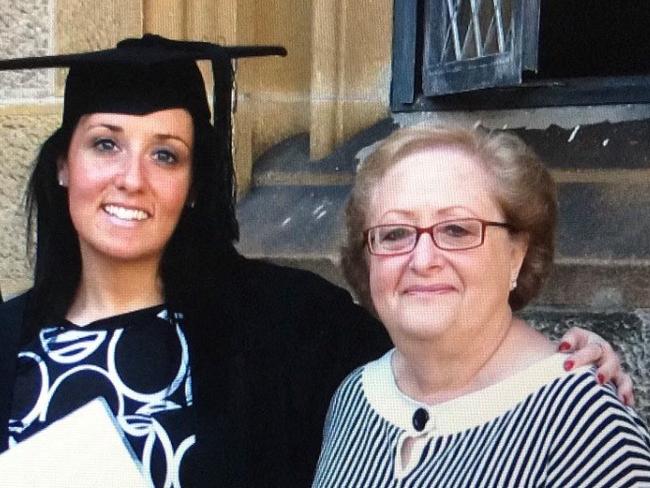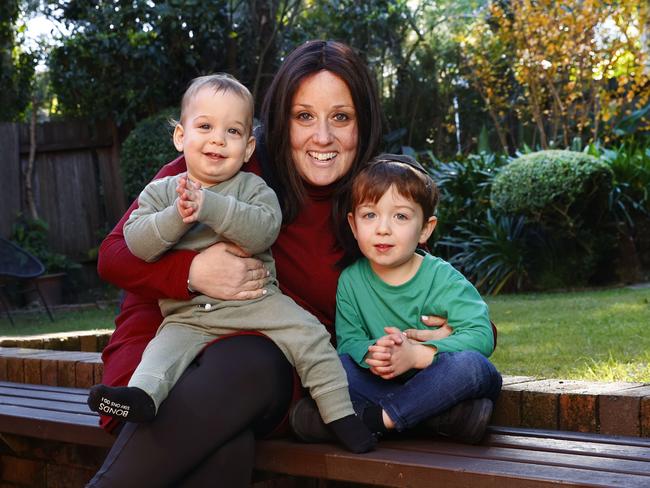Documentary follows a Sydney family’s IVF journey over a six-year period
It took Janine Davidowitz six years to fulfil her mother’s dying wish. Now she is helping destigmatise conversations about IVF in an Australian-first.
Sydney Weekend
Don't miss out on the headlines from Sydney Weekend. Followed categories will be added to My News.
When Janine Davidowitz sat at her mother’s deathbed in 2015, she made a promise.
The only surviving child of Holocaust survivors, Janine’s mother Betty Levy had a dying wish. That Janine have more than one baby, so they wouldn’t know the pain of being an only child that Betty had suffered.
Janine and her husband Shimon have since fulfilled that wish, on an infertility-fuelled IVF journey spanning six years.
The tears shed along that road make today’s joy feel like a miracle.
“My mother used to have art hanging around her house. I have portraits of Levi, 3, and Gad, who turns one this month – they are my artworks, they are my miracle babies,” the Bondi-based teacher tells Sydney Weekend.
“Anytime something gets me down I look at them and I just say ‘wow’.
“We did it. And they are miracles. We couldn’t have had a family without IVF.
“There’s no way we could have done this on our own, if it wasn’t for science and these incredible advances in medicine.”

The Orthodox Jewish couple’s questfor afamily as a result of their unexplained infertility has led to the creation of Australia’s first documentary to follow an Orthodox couple on their fertility journey.
One In Six follows the Davidowitz’s raw, real and ultimately triumphant fertility journey through countless tests, injections, egg retrievals, painful miscarriages and bad news. But ultimately it is a story of hope.
The couple believes the documentary will enhance fertility awareness within the wider community and reduce stigma attached to infertility, something that affects one in six Australians.
“My mum was already sick when we got engaged and we were told she wouldn’t make it to our wedding day,” Janine says. “So we had a pop-up wedding and got married in the hospital on the Sunday, and then my mum passed away on the Tuesday.
“I always spoke to my mum about having kids. She was an only child because her brother and sister were put into hiding during the Holocaust.
“My grandmother used to go and visit them every day, and one day she went back and the convent was empty. All the kids were taken.
“So my grandparents decided to have one more child, and that was my mum.
“My grandfather never spoke about the children that he lost, and my grandmother was very doting and overprotective with my mother and she found it very hard as an only child, so she always made me promise that I would do anything not to have an only child.”
It was seven months after Betty’s death before the couple could even think about trying for children – the grief was too overpowering. But when they did, six months went by with no result.
They contacted the Australian Jewish Fertility Network, which put them in touch with a rabbi to guide them through the process, the Orthodox way. That was in 2017, when they had been married for two years.

“It took its toll on me. I found it really hard, running up to Bondi Junction all the time, having blood tests and having scans and then running to school and teaching,” Janine says.
“We did our first IVF cycle in June of 2018, and we were very lucky. We got Levi the next February with our first cycle from which we got four embryos. We put two in for Levi, and one didn’t eventuate.”
They waited nine months before trying for baby number two, starting the hard journey again in November of 2019.
“I put my next embryo in, which failed, and then in January, I put another one in, which also failed, so I had no embryos left,” Janine says.
“In February of 2020, as we were starting the pandemic, I did a second cycle from which I got three embryos. We put one in straight away but I miscarried at nine weeks.
“As I miscarried, we went into a full lockdown, so that was really hard for me.
“I was always taught you get back on the horse – you have a car accident, you get back in the car and face your fear – but they stopped elective procedures because of the pandemic, so we had to wait again.
“When I look back it was seven weeks, which doesn’t sound like much but I was ready to start again and every day seemed like a year.”
In June, they started another cycle, and put in another embryo, which also failed. The next month, another failed and they had to start yet another cycle. In August, just before Janine’s 40th birthday, doctors realised she was over stimulated and they had to let another embryo go. It felt hopeless but they couldn’t give up.
“I wanted to keep trying. I said as long as the doctors say it’s possible, we will keep trying,” Janine recalls.
“In October I started a new cycle. They put me on different types of meds and I fell pregnant the first go. That’s what the documentary is about. You can actually see I got eight eggs and out of those only two embryos fertilised. We put one in and finally, I got my second son, Gad, who is 12 months this month.
“And I still have one in the freezer.
“We got our family.”

At no time was it easy but Janine and Shimon were buoyed by the financial assistance and support of the Australian Jewish Fertility Network to keep their dream alive.
“You get really sick and the medications play tricks on you and you’re bloated and feel yuck and it’s a waiting game,” Janine says.
“You’re waiting for the eggs, you’re waiting to get them taken out and then it’s injections all the time and you’re waiting for a blood test.
“Then you’re waiting for a pregnancy test and then, positive or negative, you’re waiting for the next cycle. It’s so hard but we want others to know it is possible.
“My mum would love these boys, and I feel she sent Gad down to us.”
Janine says putting in their last embryo isn’t off the cards – deep down, she’d love a little girl she could name after her mum. But to people going through the highs and lows of infertility, she says being open and asking for help is vital.
“No one is alone on their journey,” she says. “We can destigmatise it. People need to talk about it. It needs to be regular, over-the-table conversation like ‘I’m going to have a colonoscopy … I’m getting my eggs taken out’.
“People need to be there for each other.
“We want no one to be alone on this journey. We want other families to get what we did.
“Being a mum is the best job I’ve ever had, and I don’t take one day for granted. I know how lucky we are.”
IVF Australia Fertility Specialist Associate Professor Gavin Sacks says One In Six shows how IVF can be tailored to cultural and ethical beliefs, and how personalised treatment is key.
“When I first met Janine she had already had two or three IVF cycles and four transfers, so it was quite tough already,” Sacks says.
“Then they found funding from the Jewish Fertility Network. It is a really great thing that they were sponsored by this great organisation to help people, and as part of that, they decided to make a documentary of their journey.
“This is a particularly special thing, because we don’t have many observations of being able to follow a couple through the whole journey.
“IVF is really tough in many ways – emotional, physically, and the cost. But the hope is just enormous.”
He says although it worked for Janine and Shimon, One In Six doesn’t make the process feel easy.
“It does capture how she had failures before, and I think it’s quite important for people to know, because failures are almost part of the IVF journey,” he says. “Because trying to conceive naturally is full of failures, too.”
In Australia, one in 20 babies born is conceived through IVF – a number he expects to go up significantly in coming years.
“There’s a huge amount of IVF going on and I think this proportion is going up all the time,” he says.
“Science is amazing and it does enable all kinds of treatments so we think of standard fertility diagnoses such as blocked fallopian tubes or low sperm counts, or endometriosis.
“But there are also people who have unexplained infertility where we can’t find a specific diagnosis, and IVF works for them, as well as same sex couples, and other genetic reasons people do IVF to exclude genetic disease.
“It’s an extraordinary thing.”





